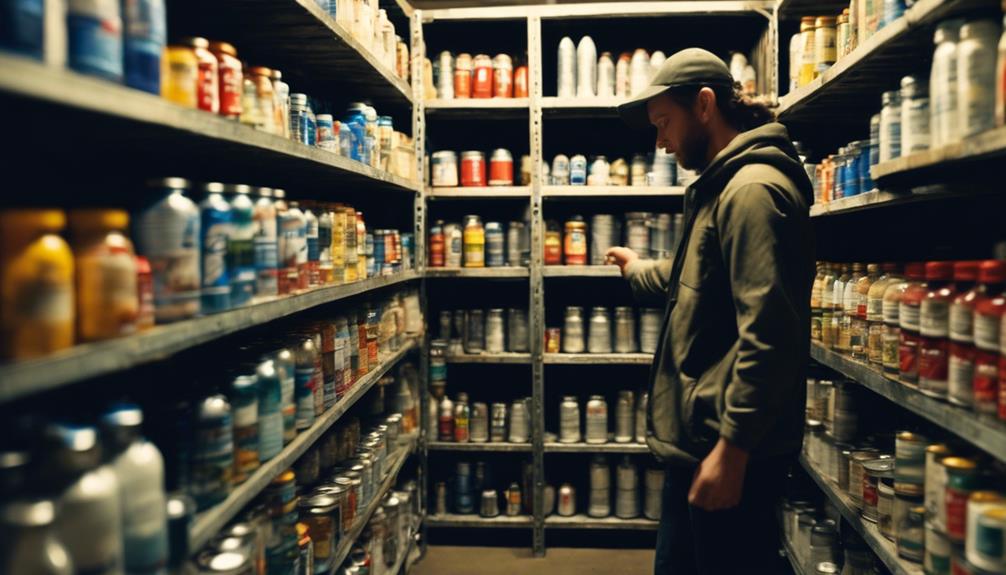If you're curious about preppers and survivalists, know this: preppers stockpile gear for urban survival, while survivalists focus on wilderness skills. Preppers prep for varied situations, investing in long-term resources and for community strength. Survivalists, however, master primitive living and value off-grid autonomy. The contrast lies in readying for societal collapse versus sustaining off the land. This insight into their distinct lifestyles reveals intriguing approaches to self-sufficiency and preparedness.
Key Takeaways
- Preppers focus on stockpiling supplies for urban emergencies.
- Survivalists prioritize wilderness survival skills and off-grid living.
- Preppers emphasize community strength and family preparedness.
- Survivalists value self-sufficiency, basic tools, and lightweight gear.
- Preppers invest in diverse tools, long-term food storage, and backup power.
Preppers and Survivalists: Key Distinctions
Distinguishing between preppers and survivalists reveals contrasting approaches to emergency preparedness and survival strategies.
Preppers focus on accumulating supplies and preparing for various scenarios, often with a more defensive mindset and urban lifestyle. They invest in long-term storage food, diverse tools, and backup power sources. Preppers tend to engage in group activities, focusing on family preparedness and community strength.
In contrast, survivalists prioritize honing primitive skills and thriving off the land in extreme situations. They favor lightweight gear and basic tools for wilderness survival. Survivalists rely more on utilizing surrounding resources, seeking remote locations, and practicing minimalism for survival.
Additionally, preppers may opt for solitary living or small, close-knit groups. Understanding these distinctions can help you align your emergency preparedness and survival approach with either the prepper or survivalist mindset, depending on your preferences and priorities.
Principles of Prepping Vs. Survivalism

When comparing the principles of prepping and survivalism, you'll notice distinct approaches to emergency preparedness and survival strategies. Preppers focus on stockpiling resources and preparing for various scenarios in urban settings. They prioritize having a wide range of supplies, including first aid kits, long-term storage food, and gadgets to make sure they're ready for any situation that may arise.
In contrast, survivalists emphasize living off the land and honing primitive survival skills. They often choose to live in rural areas, value solitude, and prioritize wilderness survival techniques. Survivalists make plans centered around self-sufficiency, basic tools, and lightweight gear for extreme situations.
While preppers are geared towards being well-equipped for emergencies in populated areas, survivalists lean towards the ability to thrive in the wilderness, embodying a lifestyle of living off-grid and relying on essential survival skills.
Survivalist Lifestyle: Living Off-Grid

Living off-grid as a survivalist involves prioritizing self-sufficiency, minimal reliance on modern utilities, and utilizing natural resources.
In remote locations, survivalists embrace an off-grid lifestyle by building shelters, growing their own food, and harnessing renewable energy sources like solar power.
Water collection, purification methods, and waste management are vital components of this lifestyle.
Security measures such as perimeter defenses and surveillance systems are prioritized to safeguard against potential threats and guarantee the sustainability of the off-grid lifestyle.
By living off-grid, survivalist groups cultivate independence, resilience, and a profound connection with nature.
This lifestyle not only fosters a sense of self-reliance but also encourages a deeper appreciation for the Earth's resources.
Embracing the off-grid lifestyle empowers survivalists to thrive in harmony with their surroundings while preparing for unforeseen circumstances.
Community Vs. Solitude in Prepping

Preppers often weigh the benefits of community support against the advantages of solitude in their preparedness efforts. While self-sufficiency is a core tenet of prepping, the value of community, group involvement, shared resources, collaboration, and mutual support can't be overlooked.
Many preppers recognize that forming or joining a prepping group can enhance their overall preparedness. These community-oriented preppers engage in activities such as organizing training sessions, drills, and meetings to exchange knowledge, skills, and supplies, ultimately improving group readiness and cohesion.
Skills Vs. Supplies: Survivalist Approach

Fundamentally, survivalists prioritize honing primitive survival skills such as hunting, shelter-building, and navigation in preparation for extreme scenarios without modern conveniences. The focus lies on developing self-reliant abilities to thrive in challenging conditions by adapting to the environment and utilizing natural resources efficiently for sustenance.
Instead of relying heavily on stockpiling supplies, survivalists believe in mastering basic survival techniques for long-term sustainability in isolated or harsh conditions. This approach emphasizes minimalism, where essential skills take precedence over accumulating supplies.
By cultivating a diverse set of skills, survivalists aim to be adaptable and resourceful, ready to handle whatever challenges come their way. The primitive nature of these skills allows individuals to connect more intimately with their environment and foster a deeper sense of self-sufficiency.
Fundamentally, the survivalist approach values the ability to adapt, survive, and thrive with minimal resources in a self-reliant and sustainable manner.
Frequently Asked Questions
What Is the Difference Between a Prepper and a Survivalist?
When distinguishing between preppers and survivalists, remember preppers focus on short-term emergencies and urban life, while survivalists prioritize extreme wilderness survival and self-sufficiency. Both groups prepare differently based on their distinct lifestyles and priorities.
What's the Point of Preppers?
In uncertain times, the goal of prepping is to guarantee you're prepared for anything. By stockpiling essentials and honing survival skills, you can protect yourself and your loved ones during emergencies and crises.
What Kind of Person Is a Prepper?
When you ask, "What kind of person is a prepper?" A prepper is someone who values preparedness, stocking supplies, and developing skills for emergencies. They prioritize self-reliance, planning for various scenarios, and ensuring family well-being.
What Is the Meaning of the Word Prepper?
The meaning of the word prepper is someone who actively prepares for emergencies and unforeseen events. Preppers focus on self-reliance, stockpiling essentials like food, water, and medical supplies to guarantee readiness.
Conclusion
So, now you understand the prepper lifestyle – always prepared, always ready for anything. It's ironic, isn't it? The ones society once called paranoid are now the ones who might just have the last laugh. Who's ready now?
Keep on prepping, because you never know when you'll need those survival skills. Stay safe, stay prepared, and stay one step ahead. Survival of the fittest, right?
It's a prepper's world after all.










